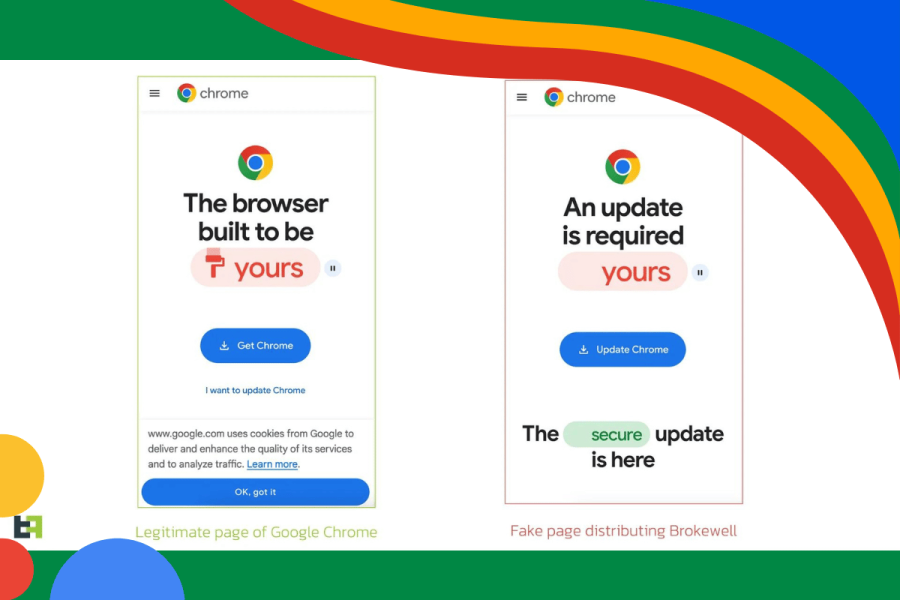Top 5 Tech News Stories of the Week Ending 19/05/2024

Urgent Warning Issued to Android Users Over Bank Emptying Bug.
Android phone users have been issued an urgent warning over a new type of malware that could empty their bank accounts. The bug, named 'Brokewell', is a Google Chrome update. Once downloaded, it allows cybercriminals to access the entire device, including banking apps. Users are advised to be cautious and only download updates from official sources, such as through the Google Play store.

Android phone users have been issued an urgent warning over a new piece of malware that could empty their bank accounts. The bug, called Brokewell, disguises itself as a Google Chrome update.
Once downloaded, cybercriminals can access personal data and take over the entire phone, potentially allowing them access to banking apps. Technology experts are warning users to make sure they are downloading legitimate updates.
In recent screenshots shared by Threatfabric, it was shown how difficult it is to spot one of these fake updates. The group told Android phone users who use the Google Chrome app to surf the web to be extra careful about what they install to avoid any risk of getting their personal information stolen.

The arrival of Brokewell marks a move away from launching dodgy apps to try to hack people’s phones, something cybercriminals have been doing for years, of which more and more users are aware. By appearing as a perfectly legitimate update to an existing – and well-known – app, users may not stop to consider what they’re doing before hitting download.
However, with the discovery of Brokewell, it is even more important to take your time and properly consider anything that asks you to update your device. If in doubt, ignore an update prompt and update the app manually.
Google Cloud Accidentally Deletes Large Customer's Infrastructure
In a significant blunder, Google Cloud accidentally deleted a large customer's account, including all its backups. The customer, UniSuper, an Australian pension fund that manages $135 billion worth of funds, had some backups with a different provider and could recover its data. The incident has raised questions about the reliability of cloud services and the importance of having backups with different providers.

In a significant blunder, Google Cloud accidentally deleted a large customer's account, including all its backups. The customer, UniSuper, an Australian pension fund managing $135 billion worth of funds, had some backups with a different provider and could recover its data.
The incident occurred due to an inadvertent misconfiguration during the provisioning of UniSuper’s Private Cloud services. This misconfiguration triggered a previously unknown software bug that impacted UniSuper’s systems, resulting in the deletion of UniSuper’s private cloud subscription.
A combination of rare issues at Google Cloud caused the disruption of UniSuper services. This was unprecedented, and measures have been taken to ensure this issue does not happen again.
UniSuper had its services and data duplicated across two Google Cloud regions, but this regional separation was effectively virtual because copies in both regions went south due to an internal Google error.
This incident has raised questions about the reliability of cloud services and the importance of having backups with different providers. It reminds us that even with the most robust systems, errors can occur, and it's crucial to have a disaster recovery plan in place.
When setting and planning your Disaster Recovery and backup solution, the best solution is the 3-2-1 rule. The 3-2-1 is a best practice for backup and recovery. It means you should have 3 copies of your data (your production data and 2 backup copies) on two different media (disk and tape) with one copy off-site for disaster recovery. This strategy provides maximum data protection and quick data restoration during a data loss incident. It’s a reminder that relying solely on one provider or method can leave data vulnerable, as the Google Cloud incident highlighted. Having multiple backups in different locations is crucial for comprehensive data protection.
AI Safety Summit and the AI Act
The AI Safety Summit, hosted by South Korea and attended by governments, companies, and civil society, focused on AI safety and addressing the potential capabilities of the most advanced AI models. In addition, the EU’s AI Act, the world’s first risk-based legislation on machine learning, was signed off by EU ministers, meaning that the rules start applying in June.

The AI Safety Summit, co-hosted by Korea and the United Kingdom, was a stage of competition between countries seeking to lead discussions on internationally accepted rules governing AI. The summit focused on the safe use of artificial intelligence (AI), exploring ideas on safety, innovation, and inclusivity.
In addition, the EU’s AI Act, the world’s first risk-based legislation on machine learning, was signed off by EU ministers. This means that the rules start applying in June⁴. The Act requires developers of specific AI systems to be upfront about their risks and share information about the data used.
The UK and US have signed a landmark deal to work together on testing advanced artificial intelligence (AI). The agreement signed says both countries will work together on developing "robust" methods for evaluating the safety of AI tools and the systems that underpin them⁴. This agreement builds upon commitments made at the AI Safety Summit held in Bletchley Park in November 2023.
The event was attended by AI bosses including OpenAI's Sam Altman, Google DeepMind's Demis Hassabis and tech billionaire Elon Musk, saw both the UK and US create AI Safety Institutes which aim to evaluate open and closed-source AI systems.
These developments highlight the growing importance of AI safety and the need for international cooperation and regulation in this rapidly advancing field.
Apple's WWDC 2024 Event
Apple announced the date for its next Worldwide Developer Conference - June 10, 2024. The event is expected to reveal Apple’s next batch of software updates – iOS 18, iPadOS 18, and macOS 15 – as well as some hardware reveals. One reveal that seems all but certain is the announcement of Apple’s big generative AI plans.

Apple has announced its next Worldwide Developer Conference (WWDC) date - June 10, 2024. The event is expected to reveal Apple’s next batch of software updates – iOS 18, iPadOS 18, and macOS 15.
The conference will last for several days, but it's the first day when we'll see Apple's keynote presentation and where all the big news will be announced. Every year, Apple hosts a conference telling app makers and the world what to expect from its next batch of software updates.
One reveal that seems all but particular is the announcement of Apple’s big generative AI plans. Apple boss Tim Cook said the company will make significant strides in generative AI this year.
Developers and students can celebrate in person at a special event at Apple Park on opening day. WWDC24, free for all developers, will spotlight the latest advancements in iOS, iPadOS, macOS, watchOS, tvOS, and visionOS.
The event will also provide developers with unique access to Apple experts and insight into new tools, frameworks, and features. This year’s conference will include video sessions and opportunities to engage with Apple designers and engineers and connect with the worldwide developer community.
Google Pixel 6a Laid to Rest
Google has decided to discontinue the Pixel 6a. The company's next official event is I/O 2024, which kicks off on May 14. At that event, more details are expected to be revealed.

This week, Google unceremoniously killed off the Pixel 6a. The budget smartphone was pulled from all of its official online stores all over the world. Even the official protective case has disappeared from the digital shelves.
The Pixel 6a was initially tipped to launch in May, around the time Google usually holds its annual I/O conference. However, due to production and supply chain issues, the release date was pushed back to July. Despite the anticipation, Google has now decided to pull the plug on the Pixel 6a.
The news has left many potential buyers disappointed and has raised questions about Google's future plans for its smartphone line. It's a reminder of the volatile nature of the tech industry, where products can be shelved even after they've been officially announced.




